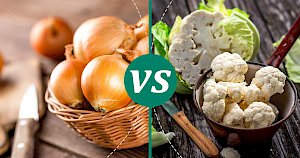Cauliflower vs Onion: Calories & Nutrition Showdown


Cauliflower vs Onion
Nutrition Facts
Serving size:
change
5g10g15g20g30g40g50g60g80g100g120g140g160g180g200g220g250g300g350g400g450g500g600g700g800g900g1000g
1oz2oz3oz4oz5oz6oz7oz8oz10oz12oz15oz20oz25oz30oz35oz40oz50oz
Amount Per Serving:
Serving size:
change
5g10g15g20g30g40g50g60g80g100g120g140g160g180g200g220g250g300g350g400g450g500g600g700g800g900g1000g
1oz2oz3oz4oz5oz6oz7oz8oz10oz12oz15oz20oz25oz30oz35oz40oz50oz
Amount Per Serving:
Cauliflower vs Onion 100g Compare
| per 100g | Cauliflower | Onion |
|---|---|---|
| Calories | 25 | 40 |
| Carbohydrates | 4.97 g | 9.34 g |
| Fat | 0.28 g | 0.1 g |
| Dietary fiber | 2 g | 1.7 g |
| Protein | 1.92 g | 1.1 g |
| Calcium | 22 mg | 23 mg |
| Iron | 0.42 mg | 0.21 mg |
| Magnessium | 15 mg | 10 mg |
| Potassium | 299 mg | 146 mg |
| Sodium | 30 mg | 4 mg |
| Vitaminium B1 (Thiamine) | 0.05 mg | 0.046 mg |
| Vitaminium B2 (riboflavin) | 0.06 mg | 0.027 mg |
| Vitaminium B3 (Niacin) | 0.507 mg | 0.116 mg |
| Vitaminium B5 | 0.667 mg | 0.123 mg |
| Vitaminium B6 | 0.184 mg | 0.12 mg |
| Vitaminium B9 (Folic acid) | 57 mg | 0.019 mg |
| Vitaminium C | 48.2 mg | 7.4 mg |
| Vitaminium E | 0.08 mg | 0.02 mg |
Discover the Nutritional Benefits of Cauliflower and Onion
When it comes to vegetables, cauliflower and onion are two staples in many kitchens around the world. Each brings its unique flavors and nutritional benefits to the table, making them favorites among chefs and home cooks alike. But beyond their culinary uses, how do these vegetables compare in terms of nutrition? Let's dive into an interesting comparison between cauliflower and onion, highlighting their health benefits and nutritional content.
A Closer Look at Cauliflower
Cauliflower is a versatile vegetable that belongs to the cruciferous family, a cousin to broccoli, kale, and cabbage. It's well known for its ability to absorb flavors and can be prepared in a variety of ways, such as steaming, roasting, or even as a substitute for rice or mashed potatoes. But cauliflower is not just a culinary chameleon; it's also packed with nutrients. With only 25 calories per 100 grams, it's low in calories yet rich in vitamins and minerals. Cauliflower provides a good amount of vitamin C, with 48.2 mg, and also offers vitamin K, vitamin B6, and potassium. It's a great source of fiber, with 2 grams per serving, which can aid in digestion and promote a feeling of fullness.
Onion: The Flavor Enhancer
Onions, on the other hand, are known for their pungent flavor and aroma, making them a fundamental ingredient in many dishes worldwide. Beyond their culinary uses, onions offer various health benefits. They are slightly higher in calories than cauliflower, with 40 calories per 100 grams, but still considered low-calorie. Onions are a good source of vitamin C, providing 7.4 mg, and contain vitamins B1, B2, and B6. They also boast a unique compound called quercetin, which has antioxidant properties. With 9.34 grams of carbohydrates and 1.7 grams of fiber, onions can support healthy digestion and provide a modest energy boost.
Nutritional Comparison: Cauliflower vs. Onion
When comparing the two, it's clear that both cauliflower and onion have their own set of nutritional benefits. Cauliflower stands out for its higher vitamin C and K content, as well as its higher fiber and protein amounts. It's also richer in potassium, which is essential for maintaining healthy blood pressure levels. Onions, while lower in vitamins C and K, provide a good amount of vitamins B1, B2, and B6, and have a lower glycemic index (GI) of 15, making them a good choice for those monitoring their blood sugar levels.
- Calories: Cauliflower has fewer calories, making it ideal for weight management.
- Fiber: Cauliflower provides more fiber, promoting better digestion.
- Vitamin C: Cauliflower is a superior source of vitamin C, supporting immune health.
- Potassium: With more potassium, cauliflower supports heart health.
- Vitamins B: Onions offer a variety of B vitamins, supporting energy and metabolism.
Ultimately, both cauliflower and onion deserve a place in a balanced and nutritious diet. They each bring unique flavors and health benefits to the table, and their versatility in cooking makes them easy to incorporate into meals. Whether you're looking to boost your vitamin intake, manage your weight, or simply enjoy delicious and healthy dishes, cauliflower and onion are excellent choices.
Cauliflower 100g
25kcalCalories source
- 66% CARBS.
- 26% PROTEIN
- 8% FAT
Onion 100g
40kcalCalories source
- 88% CARBS
- 10% PROTEIN
- 2% FAT
Compares of cauliflower
- Cauliflower vs Artichoke
- Cauliflower vs Arugula
- Cauliflower vs Asparagus
- Cauliflower vs Beetroot
- Cauliflower vs Bitter Melon
- Cauliflower vs Bok Choy
- see all compares of cauliflower
Marcin Piotrowicz
calories-info.com creator
Healthy diet and healthy lifestyle promoter
Add comment